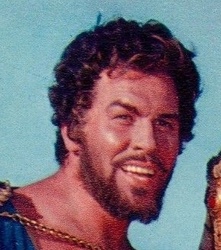HOWARD KEEL

Howard Keel was born Harry Clifford Keel in Gillespie, Illinois in 1919. His father was a coal miner and he grew up poor. His dad died when he was 11, and his mother moved to California, where Howard graduated high school and then worked first at a factory, and then as a salesman for Douglas Aircraft Company. At 20, he started taking voice lessons, and he performed publicly at 21. He was married for the first time in 1943 (he would be married two more times, but he would be single less than three months over the next 61 years!). In 1945, he got the part of understudy to John Raitt in the part of Billy Bigelow in Carousel, and he next became the understudy to Alfred Drake in the part of Curly in Oklahoma, and when that show travelled to England, Keel played the lead, to great acclaim. While there, he played a part in an English movie, The Small Voice, changing his first name to Howard. When he returned to the U.S. he was signed by MGM, and his first movie, Annie Get Your Gun, where he played Frank Butler to Betty Hutton's Annie Oakley was a big hit. He followed with both musicals and non-musicals (this very big and handsome man was a natural for roles in non-musical westerns, which were also quite popular at the time). Among his best movies were Show Boat (where he played Gaylord Ravenal) and my personal favorite, Seven Brides for Seven Brothers (where he played Adam Pontipee). Two parts he was supposed to play, but ended up not playing, were the leads in Singin' in the Rain and in Sunrise at Campobello. Those both would have been very different movies with Keel in the lead role! As the cycle of musicals wound down in the mid-1950s, Keel made a few more western or action movies, but mostly performed on stage, often in summer stock, over the next two plus decades. In 1981, Jim Davis, who played the role of Jock Ewing on the hit TV show Dallas passed away, and the producers wanted to find another older male star to play a similar role as Clayton Farlow, and they cast Keel (who looked fantastic!), and he stayed with the show for the remainder of its run, which let him quit touring in shows, and gave him financial security. In 1988, Keel had heart bypass surgery, but stayed on Dallas. The show finally went off the air in 1991, and Keel continued to make some singing appearances. He passed away in 2004 at the age of 85.

